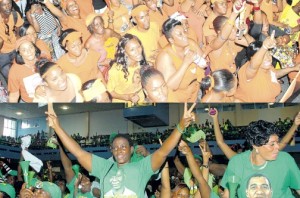
The Language of Politics
July 15th, 2015
It is almost magnetic.
What is it about that simple instrument, the microphone, that drags those words out of us, like the pull of a magnet? Those words that one is likely to regret afterwards, but can never fully retract? Once the microphone has captured your voice, your utterances, there is no going back. You can cough, stumble, say “Well, what I really meant to say was…” but that doesn’t make any difference. The cat’s out of the bag, as my grandmother used to say. The genie is out of the bottle and cannot be squeezed back in.
I was pondering this thought after a news report that stirred discomfort this week. While making a speech at a party event on Sunday, National Security Minister Peter Bunting described the Opposition as “vultures,” although it was the Jamaican name for that ugly but necessary bird – “John Crow” – that seemed to ruffle feathers (pun intended). Opposition spokesman Derrick Smith and his colleagues were, the Minister suggested, “gleefully” waiting for the next murder to take place. Well, I have never seen a “gleeful” vulture (they are actually Turkey Vultures, to give them their correct name), but that’s beside the point. The use of the local Jamaican name sounded especially derogatory; people don’t have anything nice to say about John Crows.

The humble Turkey Vulture, or John Crow. Well, at least he had a mountain range named after him. (Photo: Audubon Society)
Minister Bunting apologized in Parliament, two days later, after a lot of criticism and a very huffy press briefing called by the Opposition. The whole episode was entirely unnecessary, and had the opposite effect intended, one suspects. For instead of distracting the citizenry from the appalling murder rate, which is rising in leaps and bounds, his remarks turned the spotlight more sharply on those alarming statistics.
While making his apology the Minister conceded, “The language of politics is often rough and encouraged by the atmosphere at political rallies.” However, this was a much more formal event than a rally; it was an annual constituency conference in Eastern St. Andrew, with a proper podium, and Minister Bunting appeared to be reading from a script. So did he actually write the words “vultures” and “John Crows” and then read them out? I don’t know, and perhaps it is not significant, even if he did. Although it does go to show that more often than not, words do not just slip out. Quite often, they are deliberate, even when they seem off the cuff and impromptu. Never is this more true than in the world of politics. There is no such thing as a slip of the tongue.
I wrote not long ago about the minefield that is social media for politicians. Several have dipped their toes in the treacherous waters of Twitter, and found them much too hot. However, they seem not in the least concerned (and I am just talking about politicians in general now) about talking all kinds of rubbish, with no repercussions – except of course, for groans from the couches of numerous members of the public. “Oh, come on!” “Puleeeez!” and so on are the cries of disgust. Yet the politicians carry on blithely, “encouraged by the atmosphere” it seems. They hardly seem to need the encouragement. They are a little more polite in Parliament, but again, the “atmosphere” (desk-thumping colleagues, jeers from the other side) seems conducive to more nonsense being spouted, it seems.

The carefree, anything goes atmosphere at political rallies. Politicians can (and do) spout any nonsense just to get some cheers and a little “vibes” going. (Photo: Jamaica Observer)
And yet, the words we speak can be shared and saved in a thousand different ways online, just like a tweet. They are easier to locate than a tweet. There is SoundCloud, there is YouTube. What is worse, they can be edited down, juxtaposed with recordings of other words. Now this is where things get tricky. This is where the politicians or public figures start to say things like, “But my words were taken out of context.” They rarely clarify what the actual context is – or was. What they are really saying is, “Yes, I did say that – but I said other things too.” Ah, but they should know that in the quick fire world of the sound byte and social media shares, a short phrase can float around out there – disembodied, not anchored to anything. That’s not a happy situation for the average politician.
But I don’t expect them to change their ways any time soon. The “rough” language our politicians indulge in is a time-honored tradition, like the musical interludes and the ludicrous swaying and dancing on the podium. If they get a little too carried away they can always apologize a few days later, as Minister Bunting did. They are basically unrepentant though – and always more than willing to go down that road.
Something shared on social media the other day is perhaps relevant here. I actually prefer to look at our political leaders this way: “The older I get the less I listen to what people say and the more I look at what they do.”
I’m still looking. Looking to look, that is.
Tags: Derrick Smith, John Crow, Peter Bunting, politicians, social media, turkey vulture, Twitter
The Gleaner reserves the right not to publish comments that may be deemed libelous, derogatory or indecent.
To respond to The Gleaner please use the feedback form.
2 Responses to “The Language of Politics”
- We Are the Zoomers
- Living Online with Humans and Birds: NAOC 2020
- Human Trafficking and the Problem of Public Education
- Down Memory Lane
- Are We Ready to Recover from COVID-19?
- Road Safety Matters: Is Your Vehicle Safe?
- Sexual Harassment, Me Too, and the Minister’s Disturbing Giggle
- The Vulnerable Senior Citizens, Private Care Homes and COVID-19
- A Muddle Over Masks
- Here is Something Life-Saving You Can Do: Give Blood!



Interesting piece, Emma. Undoubtedly, we need to restore some sense of decency and civility in our politics, especially the language being utilized by various and sundry politicians. Our political language is too coarse and is of low quality, vulgar and is definitely lacking refinement. Minister Bunting’s remarks were definitely obscene, low brow, rude and off colour. Mr. Bunting knows better, even if frustrated by the pervasive and ubiquitous nature of crime, specifically murders which have become the scourge of the land. But, as you rightly contend, the paradigm today, is to speak negatively or disparagingly of someone and apologize later. Will we see more of this gutter language in terms of our politics? Certainly, we will, especially with elections in the offing, and of course, it will be rationalized or explained away by various politicians, that such language and expressions are a question of the cut and thrust of politics. Interesting times are ahead with respect to our political language.
Thanks for your comments, Esteban. You are absolutely right. The apologies afterwards are usually inadequate, and explaining it away by saying “Oh you know how it is on the political hustings,” etc. is just not good enough. No, we would like to see (and hear) our political representatives speak better at political rallies, no matter how exciting it may be. A lot of us are tired of it, and perhaps they will gradually learn to curb their tongue – especially if members of the public, as well as their political opponents, call them out each time…